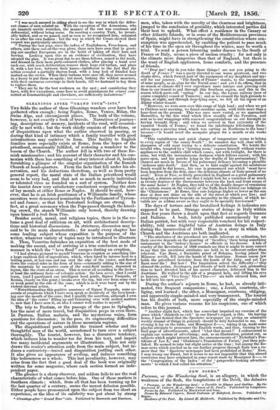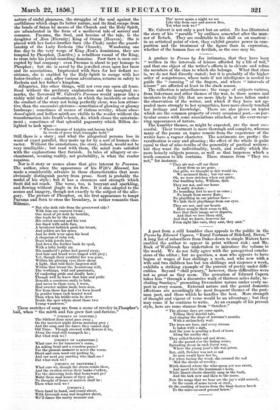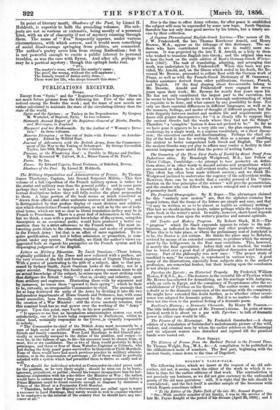NEW POEMS. * Pneuma, or the Wandering Soul, is an allegory,
in which the weakness of the flesh, the temptations of the 'Devil, the delusive
• Pneuma, or the Wandering Soul : a Parable in Rhyme and Outline. By the Reverend W. Calvert, M.A., Minor Canon of St. Paul's. Published by Longman. Poems by Isa. Published by Blackwood and Sons.
Poems by Edward Capern, Rural Postman of Bideford, Deron. Published by Bo
e.
Nnows of the Past. By Lionel H. Holdreth. Published by Holyoake and Co. nature of sinful pleasures, .the struggles of the soul against the earthliness which clogs its better nature, and its final, escape from the bonds of Satan by means of the Church and the Holy Spirit, are adumbrated in the form of a mediaeval tale of sorcery and romance. Pneuma, the Soul, and heroine of the tale, is the daughter of won (Eternity) King of Ouran (Heaven). She is placed with her foster-brother Sara (the Flesh) under the guard- ianship of the Lady Ecclesia (the Church).. Wandering one fine day to the very verge of King 2Eon's dominions, they are tempted by Phosphor, (Lucifer,) a rebellious vassal of the king, to cross into his jovial-sounding domains. Poor Sarx is soon cor- rupted by bad company : even Pneuma is about to pay homage to Phosphor ; but she is saved by the jewelled cross upon her brow and its associations. Imprisoned with Sarx for her defiant re- sistance, she is enabled by the Holy Spirit to escape with her foster-brother ; and, after various adventures, returns in safety to Ecelesia and her father's kingdom. Allegories, like other things, will not ever run upon all fours. Read without the prefatory explanation and the marginal re- marks, the Reverend W. Calvert's Pneuma would appear like a richly wild tale of enchantment, in which the incidents or rather the conduct of the story not being perfectly clear, was less attrac- tive than the successive pictures—sometimes of glowing or gloomy landscape ; sometimes of scenes of riotous revelry, whose aban- doned spent and hollow mirth are visible to the reader without the transformation into Death's-heads, &e. which closes the entertain- ment • sometimes of that splendid pageantry which Milton de- lighted to look upon- " Where throngs of knights and barons bold
In weeds of peace high triumphs hold."
Still there is a story ; and what the allegorical persons lose in want of exact parallel, they make up for by a sort of human cha- racter. Without the annotations, the story, indeed, would not be very intelligible ; but read with them, the mind rests satisfied with the explanations they furnish. In tales of allegory or en- chantment, seeming reality, not probability, is what the reader requires.
Nor is it story or scenes alone that give interest to Pneuma. The author, since the appearance of his Wife's Manual, has made a considerable advance in those characteristics that more obviously distinguish poetry from prose. Scott is probably the model of his style ; but it has a closeness and strength which Scott did not reach. The verse, too, is buoyant and sparkling, and flowing without jingle in its flow. It is also adapted to the
i scenes and imagery, though not exactly to the subject of the alle- gory. The picture of Phosphor, on his first appearance to tempt Pneuma and Sam to cross the boundary, is rather romantic than Miltonie.
" But who cloth ride from the greenwood side ? With him are coursers twain One steed of jet doth he bestride, One leads he by the rein. His velvet sureoat and his vest Are lined with sable furs, A broidered baldrick girds his breast, And golden are his spurs. And he doth wear upon his head A chaperon of ruby red, Beset with jewels rare, And down the farther bank he sped, With a lofty lordly air. His manhood's prime had passed away, And hair and beard were tinged with grey; Yet, though their youthful fire was gone, Within his glowing eyes there shone A light, that told there lingered still Within that breast the headstrong will, The workings, wild and passionate, Of cankering pride and deadly hate; Though well he knew that hate and pride Beneath a courteous smile to hide.
And never in those eyes, I ween, Had sweeter milder smile been seen.
Nor from those lips had e'er been heard In gentler tones each honied word Than when his bridle-rein he drew Beside the spot where stood those two Young wanderers."
These snatches of song are from a scene of revelry in Phosphor's hall, when " the mirth and fun grew fast and furious."
" (CHORUS OF DANCERS.)
The blithest hour must pass away On the merriest night dawns morning grey ; And the song and the dance they cannot stay Old Time. Though strewed with flowers it be, Along the road still trampeth he ; But what reek we ?
(CHORUS OF GA3LESTERS.)
What care we for tomorrow's curse, An aching head and a crosslesa purse ? For the present moment is never the worse. short and soon must our parting be, And our nest gay meeting who shall see ? But what reek we?
(CHORUS OF DRINKERS.)
What care we, though the storm-winds blow, And the swollen rivers their banks o'erflow, For the shivering fools that homeward go ? Midst these mad hours of tipsy glee No thought of home or morrow shall be : Then what rock we ?
(=onus.)
Then hand in hand, and round about, With hiccough song and laughter shout, We'll dance the merry measure out.
Tho' never again a night we see Like tills from care and sorrow free, Yet what reek we ? "
Mr. Calvert is not only a poet but an artist. He has illustrated the story of his "parable ' by outlines somewhat after the man- ner of Retsch. They are creditable to his skill as an amateur: in an artistical point of view, they exhibit greater power in com- position and the treatment of the figure than in expression, whether of the human face or devilish, as the case may be.
A preface to Poems by Isa intimates, that they have been " written in the intervals of leisure afforded by a life of toil," and that one object of the writer's efforts is to elevate and refine the members of the class to which she belongs., What that class is, we do not find directly stated ; but it is probably of the higher order of sempstresses, where taste if not intelligence is needed to guide the cunning " of the fingers, and where " intervals of leisure" are afforded at least in the slack season. - The collection is miscellaneous ; the range of subjects various, from Inkerman and other themes of the war, to those scenes and incidents in daily life that are more likely to have fallen under the observation of the writer, and which if they have not ap- pealed more strongly to her sympathies, have more closely touched her feelings and knowledge. There are also pieces on topics which are the common property of every occasional poet,—as par- ticular scenes with some associations attached, or the ever-recur- ring appearances of nature.
The humbler themes, as might be expected, are the most-suc- cessful. Their treatment is more thorough and complete, whereas many of the poems on topics remote from the experience of the writer have a vaguer character. The sentiments are pretty ; the versification is easy and pleasing ; the effect of the whole is quite equal to that of nine-tenths of the generality of poetical writers: but they want the individuality, truth, and reality which the more homely subjects possess, as well as that largeness which a truth common to life contains. These stanzas from "They are not," for instance. "They are not—all our three
Away from us are gone. -
Our girls, we thought so fair would be,
We mourned them ; but our son—
Oh, we were stricken when our pride, Our fondling baby, William, died.
They are not, and our home Is sadly desolate : No bounding feet to meet us come ; No laugh from merry Sate;
No plaything in our parlour lies—
We hide their playthings from our eyes.
They are not, and our hearts
Rave nought their room to fill,
Save that their image ne'er departs, And that we love them still, And that we know, however far
From sight like ours, they ARE, they ARE."
A poet from a still humbler class appeals to the public in the Poems by Edward Capern, "Rural Postman of Bideford, Devon." A long list of subscribers from Dukes down to simple Misters have enabled the author to appear in print without risk ; and Mr. Rock of Wallbrook has undertaken to introduce the volume to the world. We do not fully agree with the panegyrical conclu- sions of the editor ; but no question, a man who appears to have begun at wages of four shillings a week, and who now with s wife and two children has but ten shillings and sixpence a week, exhibits a striking example of the pursuit of poe' under diffi- culties. Beyond " chill penury," however, these 1. eulties were not so great as they seem. The avocation of Edward Capern takes him " through a discursive walk of thirteen miles daily, in- cluding Sundays," presenting Devonshire nature under every as- pect in every season. External nature and the genial domestia affections are accordingly the most frequent themes of the post- man poet, and those which he handles the best. More strength of thought and vigour of verse would be an advantage ; but they may come if he continue to write. As an example of his present style, here are some stanzas from " October."
" The gloomy days are come again, Telling their doleful tale, And singing the dirge of Autumn's months
With a melancholy wail.
The trees are bare, and every stream Is laden with a sigh, And the year is pouring a flood of tears Along the murky sky.
They called October sad and drear, As she passed o'er the fading scene, Spreading decay in each forest way, Where the young year's life was green.
But, still, October was not so sad As men would have her be For when baring the wood, she covered the sod 'Mid the shouts of revelry.
Mirth danced where the wine-press yet was sweet, And sport blew the huntsman's horn, While linnet-choirs cheerily sang in the bush, And the lark now and then to the morn.
Now the songs that we hear are the jay's wild screech, Or the croak of some raven or crow,
Or the rustling of leaves from the blast-beaten beech - To the mire-covered ground below." In point of literary merit, Shadows of the Past, by Lionel H. Holdreth, is superior to both the preceding volumes. His sub- jects are not so various or extensive, being mostly of a personal kind, with an air of obscurity if not of mystery running through them. The name of " Eva" frequently appears, under various circumstances, with which sorrow, and it would seem some of social disadvantage• • from politics, are cone . 'The author's poetry saves him from strong Atkicalism; but it is not powerful enough to excite a public interest to personal troubles, as was the case with Byron. And after all, perhaps it may be a poetical mystery ; though this epitaph looks real.
"ETA.
The martyr's cross, without the martyr's cause; The grief, the wrong, without the self-applause ; The homely round of duties nobly done,— These were her life, who sleeps beneath this stone."




























 Previous page
Previous page